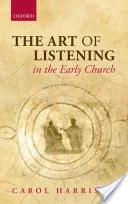In an insightful book on "the art of listening" in the early church, one of my favorite patristic scholars, Carol Harrison, devotes a chapter to the kind of hearing that goes on in catechesis. In it, she "trace[s] how early Christians became, through baptismal initiation, what might be called ‘literate listeners’ — those able to hear, understand, remember, and be receptive to Christian teaching in the many different contexts in which it came to their ears."
She begins with quotes from Augustine and John Chrysostom to capture the integral link between catechesis and hearing. In On Faith and Works, Augustine writes: "What is all that time for, during which they hold the status and title of catechumen, if it is not for them to hear what a Christian should believe and what kind of life a Christian should lead?" (Augustine, On Faith and Works 6.9; WSA I/8: 232).
Then she cites John Chrysostom, another fourth-century theologian who left behind a set of catechetical lectures, who captures the etymological link between katacheo and "hearing"—which we can still catch in the word "echo":
"First I have come to ask your loving assembly for the fruits of my recent discourse. For I do not speak only that you may hear, but that you may remember what I said and give me proof of it by your deeds; rather, you must give proof to God, who knows your secret thoughts. This is why my discourse is called a catechesis, so that even when I am not here my words may echo in your minds." (John Chrysostom, Twelth Instruction)
She discerns a pattern in the fourth-century catechumenate that can be traced back to the New Testament authors, especially in a text like Romans 10:13–15:
"For, ‘everyone who calls upon the name of the Lord will be saved’. But how are men to call upon him in whom they have not believed? And how are they to believe in him of whom they have never heard? And how are they to hear without a preacher? And how can men preach unless they are sent?"
From this, early Christians saw a three-fold pattern of becoming Christian: first hearing, then believing, then baptism (often associated with "enlightenment"; recall that in the fourth-century Jerusalem church, the newly baptized were dubbed "the enligthened," photizomenoi). Harrison states this nicely:
"All the fathers, without exception, were agreed that the catechumen—the one who was preparing for baptism—did not actually become one of the faithful (Latin fideles; Greek pistoi) until he or she was baptized. In other words, the process of baptismal catechesis or instruction (accompanied ... by various ascetic exercises, exorcisms, and anointings) was thought of as a process of formation, in which the faith was gradually inscribed upon the minds and wills of those who received instruction in it, so that they came to truly possess it; to ‘know’ and understand it or, as it was commonly put in the East, to be ‘enlightened’ by it. Only then, having first heard, and then believed, was the Holy Spirit, and the ability to pray and act as a believer, given in baptism. These three stages: first hearing, then believing, then baptism/enlightened prayer and action, enumerated by Paul [in Romans 10:13–15] ... structured early Christian identity and understanding of initiation."
Once again, I am struck by how the fathers thought about becoming Christian in terms of process and formation. They were not in a rush. Despite the urgency of the message—repent and believe!—there was still a sense of patience.
I want to return to this article later to focus on what Harrison calls "literate listeners," but it's also worth pausing to notice the importance of taking time with and for catechesis. It takes time to become Christians, and that's okay. Eugene Peterson never tired of reminding pastors that one of the most crucial virtues to cultivate in the midst of American Christianity was patience. The speed of life to which we've become accustomed today undoubtedly affects the way we think about becoming Christians. But the witness of the early church reminds us that we need not associate the urgency of the gospel call with "the tyranny of the urgent" that defines too much of contemporary life.
As we seek to guide new and old Christians in the faith through catechesis, let us do so with patience, recalling the gift of time with which God has given us—not to detract from the seriousness of the task, but to do so with attentiveness and care.


